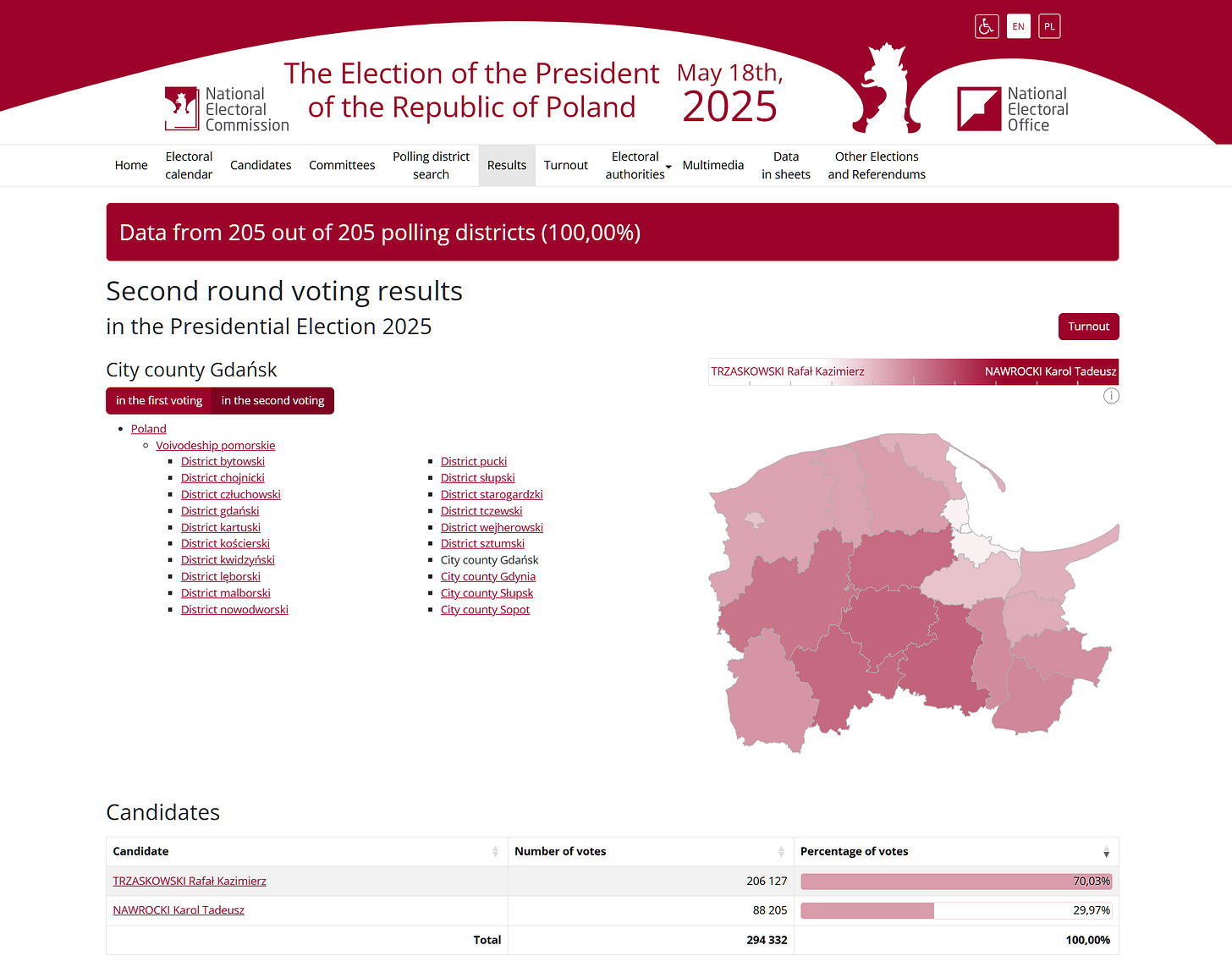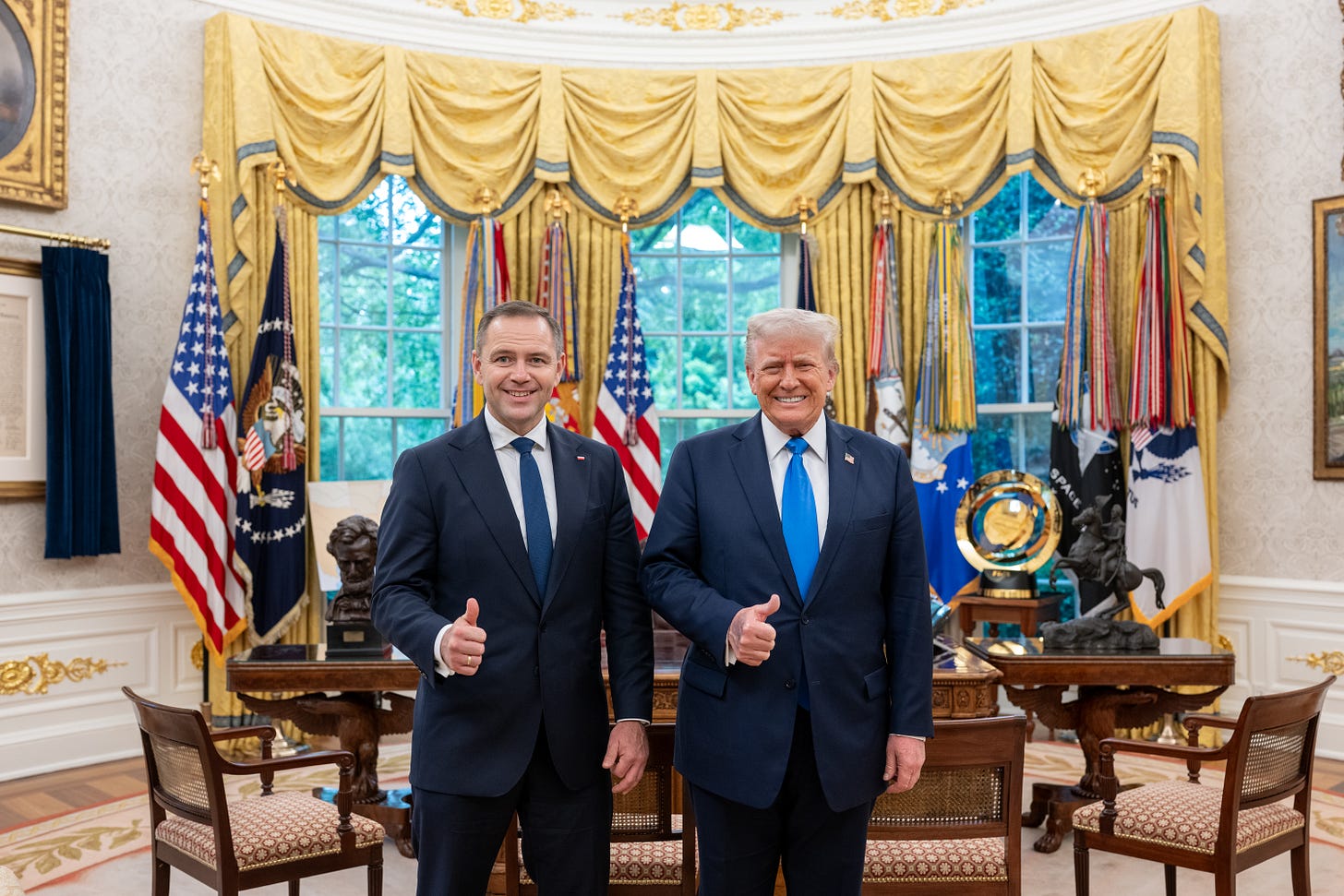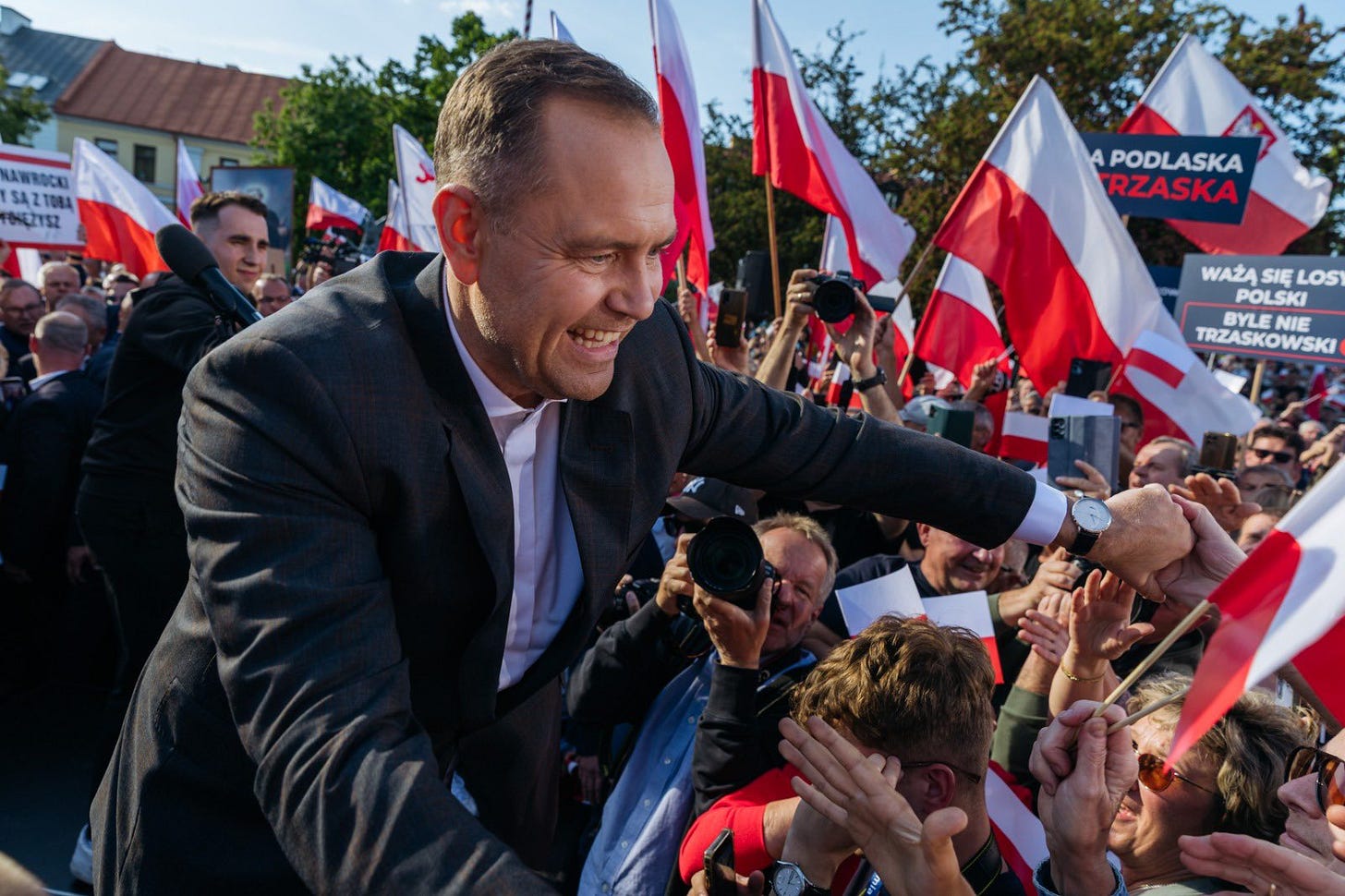Poland's Trump Moment: Karol Nawrocki's Historic Election Victory
Karol Nawrocki—Poland's underdog champion who defeated the elite, globalist-funded political machine.
A lot happened in the week we didn’t post on RRWR. Ukraine’s Security Service pulled off Operation Spiderweb—a stunning special op hitting four Russian airbases with low-cost FPV drones. Two days later, Ukraine executed a successful underwater attack on the Crimean Bridge, damaging its supports and disrupting traffic. President Donald Trump signed an executive order banning entry into the United States from 19 countries. South Korea held snap presidential elections, with Lee Jae-myung emerging victorious. Poland also held a second round of elections, where Karol Nawrocki, a grassroots candidate backed by the conservative PiS party, clinched the win. We want to zero in on that last event—specifically on the man who won, overcoming an unprecedented, organized smear campaign in Poland, illegally backed by international funds and a massive globalist media-political machine.
Dr. Karol Nawrocki achieved something that will be etched in history in golden letters. From a candidate barely anyone knew at the campaign’s start, he became Poland’s most popular politician. He did this against a vicious, relentless, and brutal media-political machine that spared neither him nor his family—not even his children.
They accused him of everything: embezzlement, lying on financial disclosures, pimping, ties to hooligan groups, and connections to organized crime. The list of idiotic accusations could go on, but their sheer volume and absurdity should tell readers one thing: this was a classic “throw everything at him, something will stick” tactic. None of it worked. Despite the lies, manipulations, and fabrications, Poles believed in Dr. Nawrocki and cast their votes for him.
Much of the credit goes to the candidate himself. From the outset, he rolled up his sleeves and got to work the old-fashioned way: he went to the people. He campaigned among voters, participated in debates, and tirelessly crisscrossed the country—multiple times. You can’t miss the parallels between Nawrocki’s campaign and Trump’s. Both met with ordinary people, campaigning in small towns. They traveled thousands of miles to meet, listen to, and understand all voters—even those who opposed them. His opponent, Rafał Trzaskowski, relied (much like Kamala Harris) on staged events and conventions with the “already convinced,” appearing in cozy, safe, sympathetic media outlets. Trzaskowski dodged debates and confrontation because, at his core, he’s a lazy pseudo-intellectual, a privileged member of the establishment. The heavy lifting was supposed to be done for him by the powerful machine of Donald Tusk’s allies on one side and Barack Obama, George Soros, and Alex Soros on the other. Investigations into foreign interference in favor of Trzaskowski will likely go nowhere since the agencies running them answer to Tusk, who, in a televised address the day after the election results, furiously vowed to fight the new president.
Nawrocki proved it’s possible to connect directly with people and that Trump’s blueprint works beyond the U.S.—as long as it’s led by a genuine, flesh-and-blood leader with unyielding character who truly cares about his fellow citizens and feels at home among ordinary, hardworking people. Poland’s citizens met him, got to know him, and liked him. They saw through the left-liberal media’s accusations that he was a crude thug—pure nonsense. And let’s be clear: the media dumped a ton of garbage on him. As RRWR readers know well, the far left and the center-left posing as liberals hold a massive advantage in Poland’s media landscape. But the lies didn’t stop at Polish media. The international machine was also involved (and this will likely become the standard in most countries—the globalist “internationale” is playing everywhere). Even the supposedly conservative New York Post ran a post-election piece from the Associated Press riddled with distortions and manipulations.
The most utterly idiotic lie spread during and after the campaign was the claim in international media that Karol Nawrocki is somehow pro-Russian. Portugal’s former intelligence chief, Jorge Silva Carvalho, called this out in an interview with CNN Portugal, highlighting the deliberate disinformation. “I’m stunned by some interpretations of Poland’s election results suggesting a shift. There’s no shift: conservative Karol Nawrocki simply replaced another conservative, Andrzej Duda,” Carvalho said. To use a pop culture analogy, it’s like accusing Batman of being the Joker’s sidekick.
In reality, Nawrocki is wanted by the Russian Federation on criminal charges tied to his efforts to remove monuments glorifying the Red Army’s presence in Poland from 1944 to 1989. As head of Poland’s Institute of National Remembrance (IPN), Nawrocki made the long-overdue decision to combat these “Soviet relics”—vile symbols of repression and murder that the Soviets, and now Russia, have always used as tools of cultural warfare. Then there’s the related accusation often leveled at the IPN: that it promotes “nationalist historical narratives.” That’s like blaming a rape victim for the crime. The IPN investigates and prosecutes crimes committed in Poland and against Poles by, among others, the Soviets and Nazis. Apparently, uncovering mass graves of murdered Poles is “spreading nationalism.”
Back to Nawrocki himself. Since taking the helm of the IPN in 2021, he’s transformed how the institute tells history. For years, the IPN struggled to reach young people and fulfill its educational mission, which, alongside research and prosecuting war criminals, is mandated by Polish law. Nawrocki changed that. Multimedia, video games, and wildly popular board games became tools in the institute’s arsenal. They started speaking to youth in a language that resonates—not condescendingly or with cringeworthy “cool” Instagram or TikTok videos. Young people need strong role models, and Poland’s history is brimming with them. Nawrocki tapped into that resource. The IPN rolled out modern, multimedia museum exhibits. Nawrocki brought serious experience to the table, having served as director of the Museum of the Second World War in Gdańsk from 2017 to 2021.
Gdańsk—the birthplace of Solidarity—is Nawrocki’s lifelong home. Born there in 1983, he grew up in the city, earned a master’s degree in history from the University of Gdańsk in 2008, and later a doctorate in humanities from the same institution. His master’s thesis, “Social Resistance to Communist Authorities in Elbląg Voivodeship, 1976–1989,” was supervised by renowned historian Dr. Grzegorz Berendt and reviewed by distinguished scholars Prof. Antoni Dudek and Prof. Wojciech Polak. His doctoral work set the course for his academic career: an unrelenting fight to restore the memory of those who resisted Poland’s imposed communist regime, especially the “Cursed Soldiers.” In recent years, these heroes have reentered Poland’s collective consciousness, and Nawrocki deserves significant credit for that. The communists, post-communists, and their “liberal center” allies fought tooth and nail to tarnish the legacy of this heroic resistance. A decade ago, they did everything to demonize the Cursed Soldiers. Nawrocki and other passionate Polish historians broke through that propaganda despite the media and financial dominance of the post-communists.

Poland’s new president is the quintessential underdog who rises to defeat a stronger foe—a trait forged in part through his amateur boxing and soccer career. Growing up in Gdańsk undoubtedly toughened him. The Tricity area (Gdańsk, Gdynia, and Sopot) in the 1990s, during Nawrocki’s youth, was a rough place. We know because we were there! Crime was rampant, and the city was steeped in despair after losing its major industries (the shipbuilding sector collapsed). You had to be tough and resilient to make it home from school with your shoes—robberies for clothes, including sneakers, were common—and without a black eye. You needed even more grit if you held conservative, patriotic views like Nawrocki’s.
Most major Polish cities lean liberal, but the Tricity, especially Gdańsk, is a unique case. Even in these elections, Nawrocki—despite being a Gdańsk native—lost to Trzaskowski (from hated Warsaw) in his hometown by a 3-to-7 margin. Being a conservative in the Tricity often means facing mockery, ridicule, or even harassment. That builds character and a thick skin, which Nawrocki clearly developed and which served him well in this campaign. He endured lies and attacks on his family and, despite limited political experience, handled it masterfully. Those same qualities will likely aid him as President of Poland.
Judging by the liberal-left media, Nawrocki will face intense pressure at least until the next parliamentary elections. As we noted earlier, Prime Minister Donald Tusk vowed in his address to fight the new president. There will also be pressure from EU federalists. But you can bet Nawrocki will withstand it—and maybe even land a counterpunch. Russia will undoubtedly deploy its full media and disinformation arsenal against him. Domestically, he’ll stand firm against radical leftist cultural ideas, including the LGBTQ+ agenda and backdoor attempts to introduce illegal migration to Poland. In foreign policy, he’ll likely continue Andrzej Duda’s legacy as a strong advocate for transatlantic ties. On Ukraine, expect a pragmatic approach. Nawrocki may not champion Ukraine’s EU or NATO accession as fervently as Duda did, but Zelenskyy will find in him a reliable ally in securing aid for Ukraine’s army and countering Putin politically. Nawrocki knows Putin differs from past Soviet leaders only in his makeup and understands that the Kremlin responds only to strength.












Why Polish new President Elect made a pledge of alligance to Vlardorf Putina, that he will not allow Ukraine into NATO? Are we having another skunk like Orban and Fico to deal with?